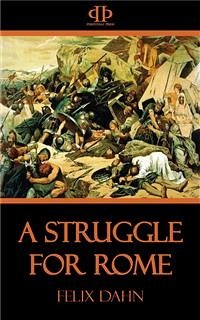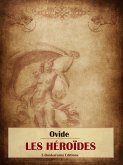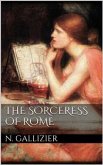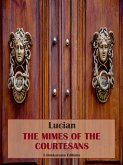It was a sultry summer night of the year five hundred and twenty-six, A.D.
Thick clouds lay low over the dark surface of the Adrea, whose shores and waters were melted together in undistinguishable gloom; only now and then a flash of distant lightning lit up the silent city of Ravenna. At unequal intervals the wind swept through the ilexes and pines on the range of hills which rise at some distance to the west of the town, and which were once crowned by a temple of Neptune. At that time already half ruined, it has now almost completely disappeared, leaving only the most scanty traces.
It was quiet on the bosky heights; only sometimes a piece of rock, loosened by storms, clattered down the stony declivity, and at last splashed into the marshy waters of the canals and ditches which belted the entire circle of the sea-fortress; or a weather-beaten slab slipped from the tabled roof of the old temple and fell breaking on to the marble steps--forebodings of the threatened fall of the whole building.
But these dismal sounds seemed to be unnoticed by a man who sat immovable on the second step of the flight which led into the temple, leaning his back against the topmost step and looking silently and fixedly across the declivity in the direction of the city below.
He sat thus motionless, but waiting eagerly, for a long time. He heeded not that the wind drove the heavy drops which began to fell into his face, and rudely worried the full long beard that flowed down to his iron belt, almost entirely covering his broad breast with shining white hair.
At last he rose and descended several of the marble steps: "They come," said he.
The light of a torch which rapidly advanced from the city towards the temple became visible; then quick and heavy footsteps were heard, and shortly after three men ascended the flight of steps.
"Hail, Master Hildebrand, son of Hilding!" cried the advancing torch-bearer, as soon as he reached the row of columns of the Pronaos or antehall, in which time had made some gaps. He spoke in the Gothic tongue, and had a peculiarly melodious voice. He carried his torch in a sort of lantern--beautiful Corinthian bronze-work on the handle, transparent ivory forming the four-sided screen and the arched and ornamentally-perforated lid--and lifting it high, put it into the iron ring that held together the shattered centre column...
Thick clouds lay low over the dark surface of the Adrea, whose shores and waters were melted together in undistinguishable gloom; only now and then a flash of distant lightning lit up the silent city of Ravenna. At unequal intervals the wind swept through the ilexes and pines on the range of hills which rise at some distance to the west of the town, and which were once crowned by a temple of Neptune. At that time already half ruined, it has now almost completely disappeared, leaving only the most scanty traces.
It was quiet on the bosky heights; only sometimes a piece of rock, loosened by storms, clattered down the stony declivity, and at last splashed into the marshy waters of the canals and ditches which belted the entire circle of the sea-fortress; or a weather-beaten slab slipped from the tabled roof of the old temple and fell breaking on to the marble steps--forebodings of the threatened fall of the whole building.
But these dismal sounds seemed to be unnoticed by a man who sat immovable on the second step of the flight which led into the temple, leaning his back against the topmost step and looking silently and fixedly across the declivity in the direction of the city below.
He sat thus motionless, but waiting eagerly, for a long time. He heeded not that the wind drove the heavy drops which began to fell into his face, and rudely worried the full long beard that flowed down to his iron belt, almost entirely covering his broad breast with shining white hair.
At last he rose and descended several of the marble steps: "They come," said he.
The light of a torch which rapidly advanced from the city towards the temple became visible; then quick and heavy footsteps were heard, and shortly after three men ascended the flight of steps.
"Hail, Master Hildebrand, son of Hilding!" cried the advancing torch-bearer, as soon as he reached the row of columns of the Pronaos or antehall, in which time had made some gaps. He spoke in the Gothic tongue, and had a peculiarly melodious voice. He carried his torch in a sort of lantern--beautiful Corinthian bronze-work on the handle, transparent ivory forming the four-sided screen and the arched and ornamentally-perforated lid--and lifting it high, put it into the iron ring that held together the shattered centre column...









